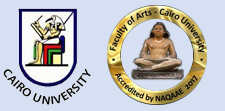عنوان المقال عربي
تخصيص الدلالة وتعميمها في الألفاظ الاستبدالية المعجمية في القراءات القرآنية
Document Type
Original Study
Subject Area
Language and Literature
Keywords English
specification of meaning, generalization of meaning, lexical substitutional words in Qur’anic readings
كلمات مفتاحية عربي
تخصيص الدّلالة، تعميم الدّلالة، الألفاظ الاستبداليّة المعجميّة في القراءات القرآنيّة
Abstract English
This study discusses the phenomena of specialization and generalization of meaning in words, and explains their causes and forms, and examines their effect on changing the meaning of lexical substitutional words in Quranic readings, from what they were in their original formulation and in their customary use in the pre-Islamic era, and what they became in the Islamic era and after it. To achieve these objectives, the study used prose texts and poetic evidence from the pre-Islamic and non-pre-Islamic eras from the era of protest, and some verses scattered in some language dictionaries that were cited to explain the meaning of the word, in addition to the respected heritage records from the Islamic era to the present day, such as: books of interpretation, such as: “Jami’ al-Bayan ‘an Ta’wil Ayat al-Qur’an” by al-Tabari, “al-Kashshaf” by al-Zamakhshari, “al-Jami’ li Ahkam al-Qur’an” by al-Qurtubi, “Fath al-Qadir” by al-Shawkani, “Ruh al-Ma’ani” by al-Alusi, and language dictionaries, such as: “Miqyas al-Lugha” by Ibn Faris, “Mukhtar al-Sihah” by al-Razi, and “Lisan al-Arab” by Ibn Manzur, as they are among the books that represent an important source in collecting and directing those words, and an important linguistic wealth that deserves to be studied. The study concluded that the most common form of semantic change in substitutional words is specification, while the forms of semantic generalization are limited, and the main reason for this is the specificity of the newly created meanings in Islamic law in general, and in the Qur’anic context in particular
الملخص العربي
تُناقش هذه الدّراسة ظاهرتي تخصيص الدّلالة وتعميمها في الألفاظ، وتُبيّن أسبابهما وصورهما، وتقف على أثرهما في تغيّر دلالة الألفاظ الاستبداليّة المعجميّة في القراءات القرآنيّة، عمّا كانت عليه في أصل وضعها وفي استعمالها العرفي في العصر الجاهليّ، وما آلت إليه في العصر الإسلامي وما بعده.ولتحقيق هذه الأهداف استعانت الدّراسة بنصوص نثريّة وشواهد شعريّة من العصر الجاهلي وغير الجاهلي من عصر الاحتجاج، وبعض الأبيات المبثوثة في بعض معاجم اللّغة الّتي استُشهد بها بيانًا لمعنى اللفظ، بالإضافة إلى المدوّنات التّراثيّة المعتبرة من العصر الإسلامي إلى يومنا هذا، نحو: كتب التّفسير، مثل: "جامع البيان عن تأويل آي القرآن" للطّبري، والكشّاف" للزّمخشري، و"الجامع لأحكام القرآن" للقرطبي، و"فتح القدير" للشّوكاني، و"روح المعاني" للألوسي، ومعاجم اللّغة، كمعجم: "مقاييس اللّغة" لابن فارس، و"مختار الصّحاح" للرّازي، و"لسان العرب" لابن منظور، بوصفها من الكتب الّتي تمثّل مصدرًا مهمّا في جمع تلك الألفاظ وتوجيهها، وثروةً لغويّة مهمّة تجدر دراستها. وخَلُصَتْ الدّراسة إلى أنّ أكثر صور التّغير الدّلالي في الألفاظ الاستبداليّة هو التّخصيص. أمّا صور التّعميم الدّلالي، فهي محدودة. والباعث الرّئيس لذلك هو خصوصية المعاني المستحدثة في الشّريعة الإسلاميّة بشكل عامّ، وفي السّياق القرآني بشكل خاصّ.
Recommended Citation
Al-Samadi, Amal Yousef Lafi and Al-Aqtash, Abdul Hamid Salman
(2024)
"Specialization and Generalization of Meaning in Lexical Substitution Words in Quranic Readings,"
Journal of the Faculty of Arts (JFA): Vol. 84:
Iss.
4, Article 2.
Publication Date
10-2-2024


